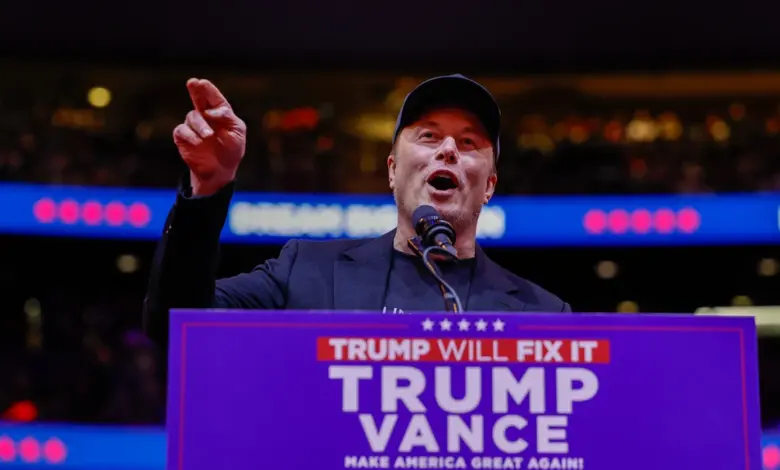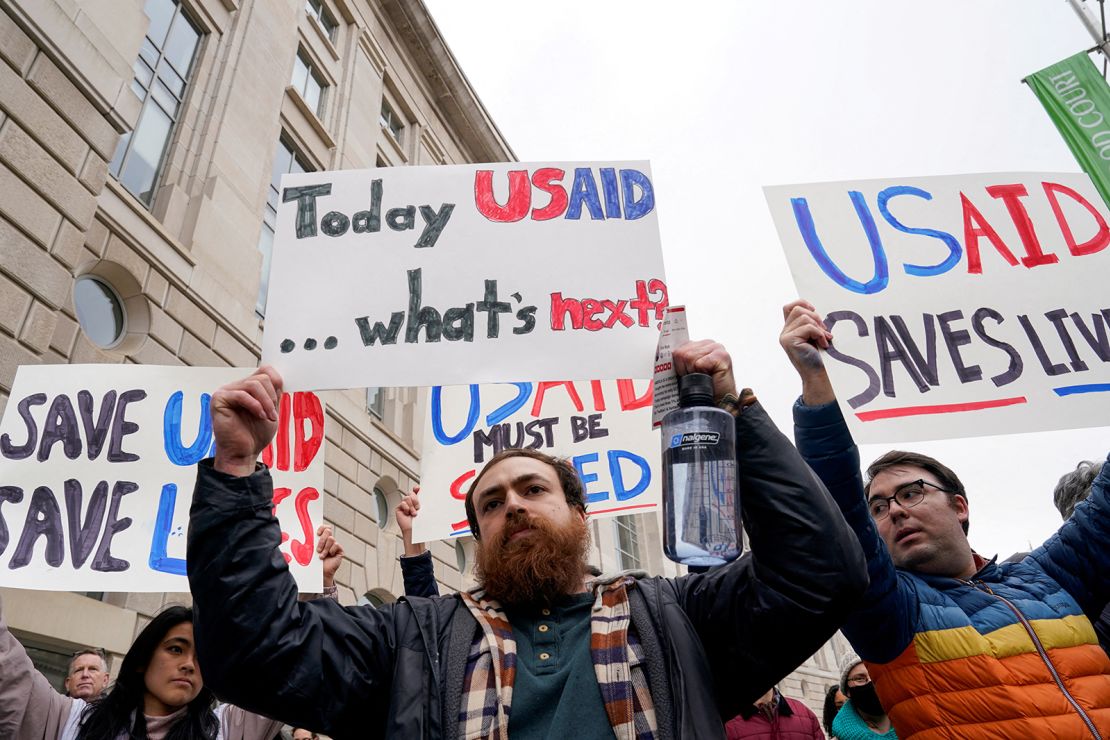
Over the last several days, Musk-aligned personnel have gained full access to the Treasury’s payments system, threatened to shut down the US Agency for International Development, offered all federal employees a sort of “buyout” plan, and in several agencies, pushed aside career civil servants – in some cases locking them out of their offices or computers.
Taken together, Musk’s moves represent an unprecedented effort to expand the power of the executive branch with little regard for laws or procedures – an effort Donald Trump foreshadowed during his successful 2024 campaign. Musk, the world’s richest man, has tens of billions of dollars in government contracts, and now, access to the innermost workings of the federal government.
“I have a hard time thinking of anyone who has exerted the kind of power and control that he has exerted over government operations in the last week,” Kathleen Clark, a Washington University law professor who specializes in government ethics, told CNN.
The question of whether Musk will comply with federal conflict-of-interest rules – and whether the Trump administration will enforce them – has drawn scrutiny from Democrats and watchdog groups.
Multiple lawsuits are also underway, with more likely to come.
Critics accuse Musk and his allies of running afoul of laws aimed at protecting the security of federal data, while seeking to shrink or outright eliminate agencies in moves that would take an act of Congress.
Musk’s ‘special’ status
After days of silence on the question of Musk’s employment status, the White House on Monday indicated that Musk has been officially serving as a special government employee. That designation means Musk isn’t a volunteer but also not a full-time federal employee.
“Special government employees are sort of like super-volunteers. They’re more empowered but less encumbered,” said Kel McClanahan, the executive director of the National Security Counselors, which represents federal employees and whistleblowers and has sued the Musk-led Department of Government Efficiency in court.
A special government employee is a temporary position for someone who works, or is expected to work, for the government for 130 days or less in a 365-day period. Musk isn’t being paid, a person familiar with his employment told CNN. He does have an office on the White House campus.
“Elon can’t do and won’t do anything without our approval. And we’ll give him the approval where appropriate. Where not appropriate, we won’t,” the president said on Monday.
As a special government employee, Musk is covered by a federal conflicts-of-interest statute that prohibits government employees from participating in matters that would affect their financial interests. That law can be enforced criminally or in the civil context, but it only by the Justice Department – in this case, Trump’s Justice Department.
It is unclear whether Musk has formally been appointed the administrator of the US DOGE entity created by a January 20 Trump executive order. The White House press office hasn’t responded to multiple CNN emails seeking that clarification.
Such an appointment would weigh on whether Musk is obligated under ethics rules to publicly file a financial disclosure form, said Clark. Also relevant to that determination is whether previous occupants of the administrator role – at the DOGE predecessor agency, the US Digital Service – were highly ranked enough in government service to fall under a mandated public release of the disclosure form.
The status of the other DOGE appointees dispersed to federal agencies is also unclear, even to staffers at the agencies. Some are now officially in employee databases and have government emails. Others have been entering agencies under visitor badges. Some staffers have reported having meetings with personnel who identify themselves as part of the political appointee team. WIRED has reported that some of the staffers brought on with political appointees at the Office of Personnel Management appear to be in their early 20s.
Taking over government HR
OPM, the closest equivalent to the federal government’s human resources agency, has been the source of mass emails being sent to all federal employees in recent days urging them to resign and be paid through September. The emails’ subject line – “A fork in the road” – matched one that Twitter employees received in 2022 after Musk bought the company.
And now the agency that has been trying to encourage mass resignations of federal employees is itself on the chopping block. On Monday, senior staff at OPM had to identify 30 percent of their workforce they could cut in the near term, with a floated goal of an eventual 70 percent reduction in staff, according to two sources. Those cuts could significantly impact OPM’s ability to perform its tasks, including benefits, services and oversight.
When asked for comment on Friday, an unnamed official replied from OPM’s media relations office with a short email broadly denying CNN’s reporting. The agency didn’t respond when asked follow-up questions or for more specifics.
Musk himself has made several visits to the OPM offices in downtown Washington, DC, sources said. But most alarming for the career civil servants at OPM, multiple sources told CNN, is that the political appointees have cut off nearly all the senior-level career civil servants at the agency.
Career civil servants at OPM, including those at the senior-most levels, have been physically moved out of their offices in the Office of the Director Annex and onto different floors. Some have also lost access to internal data systems. That has raised many alarms for civil servants concerned that the personal data, including Social Security numbers, of millions of federal employees is at risk.
“The political team has unfettered access to everything the Office of the Chief Information Officer manages,” a source at the agency told CNN. “Many of the appointees are software engineers who are making back-end changes without regard to federal norms and requirements. They are pulling statutorily required information off OPM.gov.”
The agency has had strict cybersecurity protocols in place since a 2015 hack of OPM, which compromised sensitive personal information of roughly 21.5 million people from both inside and outside the government. The hack, which US officials have blamed on Chinese spies, forced OPM and other federal agencies to overhaul their cyber defenses.
The agency now faces a lawsuit, brought by McClanahan’s firm on behalf of two anonymous federal employees, accusing the administration of failing to conduct a required data security assessment when setting up an OPM email distribution system for mass emails to the entire federal civil service.
Some of Musk’s top lieutenants have been working directly at OPM or advising at the agency since the inauguration. They include Steve Davis, the CEO of the Boring Company who helped Musk during the purge of Twitter staffers in 2022, as well as now OPM senior adviser Brian Bjelde, who had been vice president of people operations at SpaceX, and Amanda Scales, now OPM’s chief of staff who until January worked in talent at Musk’s xAI company.
Trump’s nominee to run OPM, Scott Kupor, who is awaiting confirmation, also holds deep ties to the Silicon Valley universe integral to Musk’s DOGE operations. Kupor comes from Andreessen Horowitz, the powerhouse tech venture capital shop co-founded by Marc Andreessen. Andreessen, a legend in the tech space, was closely involved in advising Trump’s transition operation.
The appointed acting director of the agency – Charles “Chuck” Ezell – was until January, an OPM branch chief for data analytics in Georgia, a jump in seniority that shocked current and former OPM staff.
Going after USAID
Shortly after Trump’s inauguration, top career staffers at USAID – which Musk has branded a “criminal organization” that should “die” – were placed on immediate leave. The entire executive team and every deputy in the agency, which dispenses billions in humanitarian aid and development funding annually, were suddenly gone.
According to sources, personnel from the Musk-created office then physically tried to access the USAID headquarters in Washington, DC, and were stopped. The DOGE personnel demanded to be let in and threatened to call US Marshals to be allowed access, two of the sources said.

The DOGE personnel wanted to gain access to USAID security systems and personnel files, three sources said. Two of those sources also said the DOGE personnel wanted access to classified information, which only those with security clearances and a specific need to know are able to access. Eventually they were able to access the headquarters.
On Sunday night, Musk said Trump had agreed the agency should be shut down. By Monday, Secretary of State Marco Rubio announced he was now acting administrator of USAID. Its website was offline and remaining staff were told to work from home.
But critics have argued that Trump can’t unilaterally abolish USAID, whose existence is written into federal law and whose budget comes from congressional appropriations.
“The president has zero legal authority to ‘shut down,’ defund, or otherwise cripple a $50 billion agency. Audit it, identify unnecessary expenditures, draft reform or rescission proposals, and then go to Congress to PASS A LAW,” Brian Riedl, a senior fellow at the Manhattan Institute, wrote on X.
Cuts and new faces at GSA
A quiet but similarly consequential Musk-driven mission has been underway at the General Services Administration, which oversees federal real estate and procurement.
The same day Trump took the oath of office, GSA employees received an email from the newly appointed acting head of the agency that highlighted the need for GSA to commit itself to “ensuring government-wide efficiency and maximizing value for the American taxpayer,” according to a copy read to CNN.
Stephen Ehikian, a former Salesforce executive who most recently worked in AI, was tapped to serve as the agency’s deputy administrator and has taken on the role of acting head of GSA until a Trump nominee is confirmed for the role. The efficiency mandate, Ehikian wrote, was “effective immediately.”
Ehikian’s email also served as the internal announcement of a series of new appointees across key roles in the agency. They include Thomas Shedd, who is taking over the leadership of the Technology Transformation Services, the essential government unit for the government’s technology products and services.
Shedd spent the previous eight years building software for vehicle and battery factories at Tesla, Musk’s car company. His approach in the new role carries echoes of Musk’s private-sector strategies, one of the people familiar with the matter said, citing a Shedd email this week to hundreds of GSA employees to schedule “touch-base” sessions and bring with them an example of a recent “technical win.”
In addition to managing the federal government’s real estate, GSA manages some of the most massive government contracts.
Critics have questioned the inherent conflict of interest in Musk’s associates working within the GSA, even though they all should have signed nondisclosure agreements. Musk has billions of dollars in government contracts, and one source familiar with the situation noted that some of his closest associates now have access to “sensitive and often classified acquisitions information for billions of dollars in government contracts.”
According to two sources familiar with the situation at GSA, every office agency must present proposals this week to cut 50 percent of their business expenses, in addition to the GSA efforts to significantly reduce the federal government’s real estate footprint.
The GSA didn’t respond to a request for comment.
Stopping payments at Treasury
Late last week, the DOGE appointees were granted full access to the government’s payments system after the top civil servant at the Treasury Department, David Lebryk, left his job unexpectedly. The DOGE appointees had clashed with Lebryk after they expressed interest in stopping certain payments made by the federal government, according to three people familiar with the situation.
Musk himself acknowledged his interest in the Treasury Department’s payment processing in a middle-of-the-night post on his social media platform Saturday.

He wrote his team “discovered, among other things, that payment approval officers at Treasury were instructed always to approve payments, even to known fraudulent or terrorist groups. They literally never denied a payment in their entire career. Not even once.”
The post appeared to ignore the mechanisms already in place for Treasury to simply fulfill lawful payment decisions made by other agencies, and that the system’s value to the federal bureaucracy and the nation’s economy lies in its reliability.
The Treasury moves have spurred a lawsuit, filed Monday on behalf of government unions and others, alleging a “massive and unprecedented” intrusion into private government data.
It adds to a pile of lawsuits that has grown quickly in the last two weeks, in some cases halting the administration’s actions.
“That’s why this whole mishmash is so troubling,” McClanahan said. “They have managed to break so many rules and so many laws with some fairly simple actions that a lot of lawyers and a lot of people in the media and politicians and everyone get tangled up on. … You’re basically punching smoke when you’re trying to litigate against this.”
CNN’s Kaitlan Collins, Rene Marsh, Alayna Treene, Jennifer Hansler, Lauren Kent, Alex Marquardt and Kevin Liptak contributed to this report.




